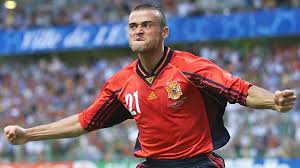Luis Enrique: A Key Figure in Modern Football

Introduction
Luis Enrique, a name synonymous with modern football, continues to evolve the game as both a player and manager. His influence extends beyond the pitch, shaping the future of football through his tactical innovations and player development strategies. The relevance of his contributions is evident in both his achievements with top clubs and the Spanish national team.
Career Highlights
Born on May 8, 1970, in Gijón, Spain, Luis Enrique began his professional career with Sporting Gijón before moving to Real Madrid, where he won two La Liga titles and the UEFA Champions League. However, it was his time at FC Barcelona that cemented his legacy as a player. At Barça, he won numerous titles, including the coveted treble in 1999.
Transitioning into management, Enrique took the helm at FC Barcelona in 2014. His tenure was marked with incredible success, winning the treble in his first season. He was renowned for his attacking style of play, which cleverly utilised the talents of stars like Lionel Messi, Neymar, and Luis Suárez. Under his leadership, Barcelona secured two more La Liga titles and a second Champions League trophy in 2015.
Recent Developments
After stepping down from Barcelona in 2017, Enrique took on the role of head coach for the Spanish national team. His approach has focused on youth development and incorporating younger players into the senior squad, a strategy that is vital as Spain seeks to reclaim its status as a football powerhouse. During his tenure, Spain has showcased impressive performances, including reaching the Euro 2020 semi-finals and a solid showing in the ongoing FIFA World Cup qualifiers.
Impact on Football
Enrique’s impact resonates through his commitment to developing players and encouraging attacking football. His tactical flexibility, demonstrated during high-pressure matches, has won acclaim and set benchmarks for aspiring coaches. Moreover, his focus on inclusivity within his teams has paved the way for upcoming talents from diverse backgrounds.
Conclusion
Luis Enrique remains a pivotal figure in contemporary football, embodying the spirit of innovation and dedication to excellence. As he continues to influence the Spanish national team, the football community watches keenly to see how his strategies will further evolve. Fans and aspiring professionals alike can glean invaluable lessons from Enrique’s journey, as his story illustrates the importance of adaptability and vision in achieving greatness in sports.









